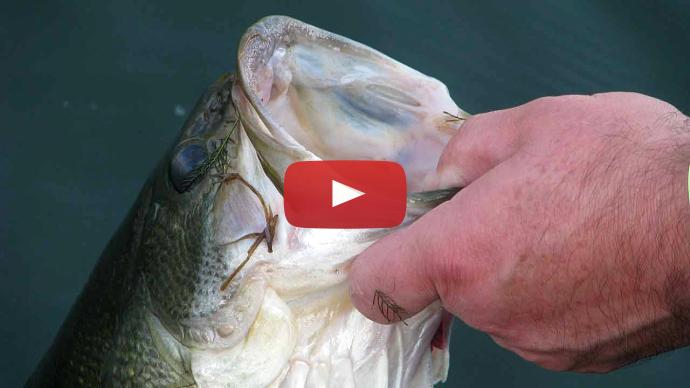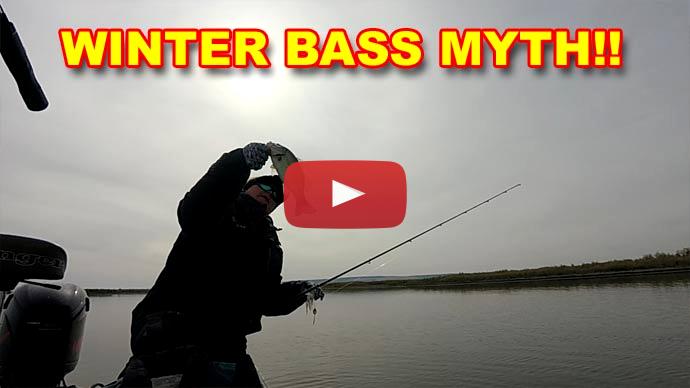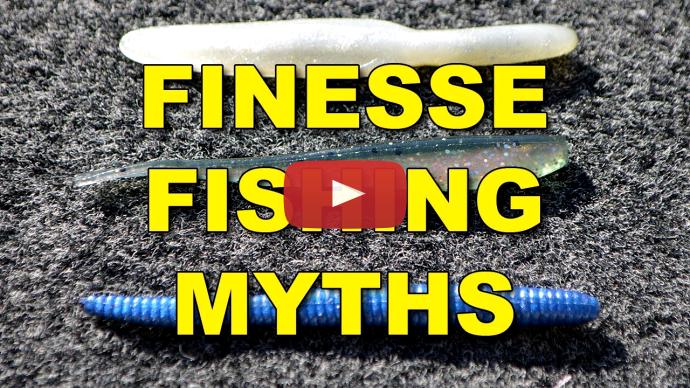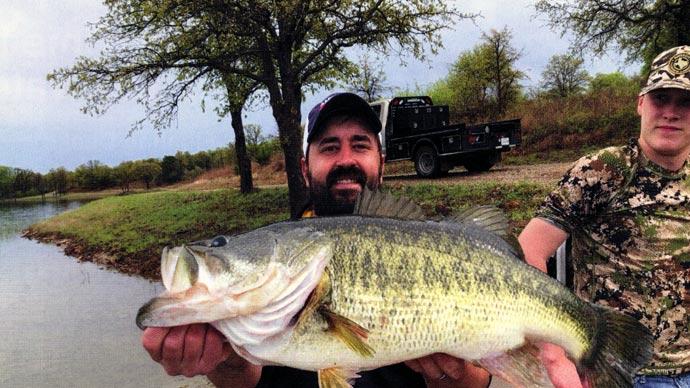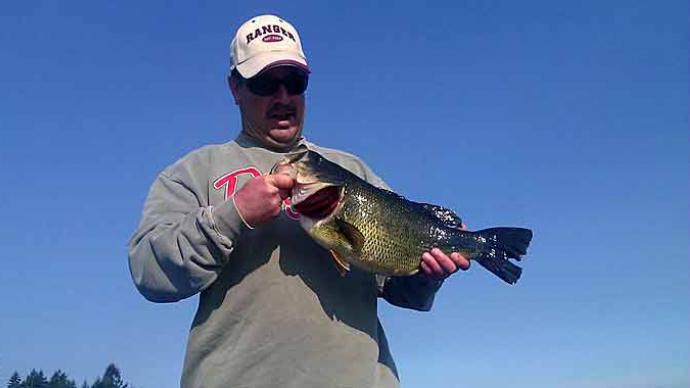Here we go. Good fish. There we go. Stay down. Come here. Here we go, baby. Come on aboard. Look at that. How'd you like that guys?
Hey folks. Glenn May here with the BassResource.com. And with all the videos that we do for you guys, the key thing is want to bring to you factual information that helps you become a better angler. And so today, I want to talk to you about the nine biggest myths in bass fishing. These are the things they get carried around on the internet and people tell each other these things and somehow they become fact and they're not. So I want to help you guys out with this, change all that.
So here's starting off with number one here, and that is bass become dormant in cold water during the winter. So when the fall season approaches, we undoubtedly hear how bass fishing will be awesome since the fish stock up and eat a whole lot prior to the long winter of inactivity. No doubt fall really is a fine time to go fishing and big fish seem to be a lot more active, so it's a great time to get out there. But this shift has more to do with an altered habitat and prey movement than bass seeking their last meal for months.
The metabolism of bass is controlled by the water temperature, so as the water temperature cools down, their metabolism slows down, which means they don't eat as much. It doesn't mean they stop eating. They just don't eat as much. So during the summertime, they're eating like 10 times more than they do in the wintertime, so that's why you're not catching as many bass in the wintertime. So during the cold winter months and the colder periods when the water temperature is really low, largemouth and smallmouth they like to strike lures jigged below a hole in the ice. And believe it or not, in Northern States, many of the biggest bass caught each year come through ice, okay? So, guys, the fish, they do keep biting.
The second myth, this is the one that really like, this is one of my personal annoyances, and that's that bass strike hooks because they're red. Now all kinds of manufacturers have rushed to capitalize on this myth by offering lures with red hooks, red sinkers, red blades, red line, even red spools on your reels. I've heard pros even in seminars that say that red hooks or red highlight can attract extra bites by simulating the blood of a baitfish or the gills of a fish or perhaps even a crawfish.
Actually, studies of bass vision, they indicate that they can actually detect red really easy and they can discriminate amongst shades. However, there is zero research that shows any instinctive attraction to it. Well, now why anglers might reason that blood is red, bleeding baitfish are vulnerable to attack, so hey, bass should attack something with red markings on it, right?
Well, bass don't think like that. They lack the ability to come to any kind of conclusion. In fact, they don't really reason, you know. They react on just instinct. Bass are capable of quickly learning to bite what brings a reward and ignore what bring no benefit and avoid dangerous stimuli. But the idea that bass can associate reddish markings on baitfish with red on artificial lures is really far fetched. According to what we know about their learning process, there just isn't any information out there from the scientific world that backs up that myth.
The next myth, this is a good one, modern live wells make fish care easy. There are too many anglers that simply put their catch in a live well, turn the switch to auto and forget about them until weigh in time. While that amount of aeration may be sufficient for a modest catch in cool water limits of bass weighing in the teens are oxygen-deprived in any water temperature that's above 80 degrees and you need to take measures to improve conditions, understand 80 degrees or above.
Got to run the aerators constantly to add fresh water, add ice to lower livewell temperatures. What I like to do, sometimes ice has chlorine in it, so I actually take water bottles, fill that with water and freeze those and put that in a livewell so you're not introducing any sort of chemicals or anything into the livewell. You want to keep the temperatures in that livewell five to eight degrees lower than the lake temperature and just keep those aerators running. Deficiencies in livewell design and angler behavior result in both immediate and delayed mortality.
What really gets me is you know there's TV coverage of these tournaments, it shows pros that take their fish and drop them on the deck of the boat or they put them in a livewell that doesn't have water in it yet and then they start to fill it with water. Come on, guys, that's beyond poor handling practice and less experienced anglers when they see that they might think that's the right thing to do, it's not. Make sure your livewell is ready to go before you have any fish in it and that way you're doing your best to maintain the health of that fishery.
The next myth in bass fishing is that you need a big fast modern boat in order to catch fish. You see boat anglers and the pro anglers, they sponsor sometimes seem to imply that the craft makes the angler. And in fact, it's the angler's skill rather than the boat choice that prevails. As in past times, many of the best bass fishermen still use small underpowered boats or don't even use power. They use kayaks or float tubes or just bank fish. Small boats are suited to small waters where giant bass dwell. From Florida, Idaho to California to Washington State those small waters can be awesome and full-size bass boats just can't get into them and they have trouble maneuvering through those dense timber and vegetation or there's really small lakes. And even when they do get in there, the commotion, these big boats cause often spook those bass.
So even in large waters, small slow boats force anglers to slow down and concentrate on the fish in its environment. So often many huge bass are taken by shore-bound anglers up to their elbows in the water right there in the bass environment is because it forces you to slow down and think and be meticulous. Whereas sometimes if you're in a big go-fast boat, fiberglass, you just want to get to the next spot and you may pass up on an opportunity of a lifetime catching one of those giant lunkers.
And the next myth is that tournaments harm fisheries. Now, despite booming bass fisheries in recent decades, this myth refuses to die. Anglers and managers opposed to tournaments for one reason or another, they propagate the idea that excessive mortality hurts fishing quality. Now in defensive competition one only needs to check the weights caught at waters fished constantly by tournaments by competitors for decades and see what those lakes are like. For example, Grand Lake in Oklahoma, Kentucky Lake, Lake Seminole, Lake Minnetonka, Sam Rayburn, Fork to name a few, I mean these catches on these lakes typically are as good as they are today as they've been in the past if not even better. And those lakes get hammered by tournaments.
Rayburn hosts some 300 tournaments a year, for example, and has done so for decades. More than half of the anglers that live around there participate in tournaments. But it's funny, a recent tagging study they did, they found that tournament mortality contributed from 1% to 16% of total annual mortality or the large amount of population while non-tournament catch and release fishing was 2% to 17% of the total. And angler harvest actually keeping the fish that comprise 16% to 38% of bass mortality, obviously because they're keeping the fish. What I'm saying here is in this study, it was the tournament angling that had the least effect on the population of bass. So fishing pressure, no doubt makes bass harder to catch but blame cannot be placed solely on tournaments.
You know another myth about bass fishing, actually myth about bass, is that the bass will evacuate and abandon an area that has been treated by herbicide. Now first off, I'm generally as opposed to herbicide treatments as the next bass angler. I've seen habitat damage from chemical applications and I'm concerned about disease and breakouts. But in some situations, treatments may be necessary for navigation and recreation and even for the health of the bass population. Excessively thick plant growth limits bass feeding and cuts the abundance of key prey fish like shad.
Now scientific evidence suggests that bass are not negatively affected by correct application of herbicides. Studies show that fish didn't evacuate as the chemicals were applied and collections of bass in treated and untreated waters in areas in the same body of water were actually similar. However, as vegetation dwindles and starts to die off, they start to consume oxygen then bass will move to suitable habitat that's nearby. But that's not because of the herbicides per se, it's because the vegetation is going away.
Just understand that vegetation removal should be viewed as a last resort by lake managers, but careful treatments in limited areas when they do it properly does not harm bass fisheries.
The next myth I want to bust is that only big baits catch big bass. Now this myth isn't a fallacy. You can increase the average size of bass caught by using larger lures but there's far more to it than just that relationship. Largemouth bass are named that for a reason. They have a huge giant mouth and they can eat pretty much anything that can fit in it. They'll eat bats, rats, snakes, turtles, birds, any kind of amphibian plus all sorts of invertebrates plus, of course, fish. Scientists have calculated that bass may eat items up to half their own length.
So if you have an 8-inch bait weighing in a couple of ounces linkers aren't guaranteed, but don't be surprised by the 16-inch bass that's attacking it. In fact, a recent study showed that when bass were offered forage that was around and beyond the maximum size vulnerable to attack according to these calculations I just mentioned, bass pursued and attacked prey larger than predicted and often choked on them. This result helps explain why at times miniature bass attack big top waters, big worms, floating minnows that are almost as big as them.
At the other extreme, adult bass can eat items such as small insects, water fleas, and even living on them for months when larger prey are scarce. Finesse tactics regularly account for bass from nearly three to over six pounds on these tiny offerings, sometimes even larger. The key to catching big bass with big baits is placing them in a vulnerable position where big bass live and hunt. Long main lake points, interfaces with deep water and offshore vertical structure, for example, and deep weed lines are just a few examples where big bass live.
Okay, here's another myth that is simply not true and I hear it all the time though and that is picking fish off beds is really easy and it's not sporting. Now, some anglers look down their nose on sight fishing for bedding bass as unsportsmanlike and unethical in that it takes advantage of bass at their most vulnerable moments. You know, it's really a feast or famine approach to fishing. Catching a bedding bass can be easy or it can be so difficult, it can be almost impossible to catch them and make you really frustrated.
I hear bass pros regret the fact that they spent several hours trying to attempt a bedding lunker into biting and at the end failing and returning to the weigh-in without a limit because they spent way too much time trying to get them to bite. It's just not that easy. It's either the fish is gonna bite it or he's not. It's really hard sometimes. Sight fishing is an art, guys and skilled anglers can read the behavior of a particular bass and determine the likelihood if he's going to bite it. It takes years of practice plus powers of observation, lots of patience to do it well.
You know, and on the other hand, and we think, you know, some bass, particularly in lightly fished waters may swim off a bed to eat nearly anything that you toss near it. It could be kind of crazy. So when it comes to site fishing, if you don't like it, then don't do it. But if you don't do it, understand that it's not as easy as you may think it is.
Now, this next myth is one I have been hearing for decades. It seems to just never die. And that is, "Hey, if you stock Florida strain, largemouth bass then you're going to get lunker fish in your lake." When stocked into semi-tropical environments, Florida bass tend to increase the maximum size of bass when they're stocked there. And you know, you can point to places like California and Texas for proof. But anglers everywhere else across the country, they really wanted for that kind of introduction, failing to appreciate how frail these big, huge bass actually are and they're not suited for that environment.
Florida bass evolves in the central and southern part of that state and are adaptive to conditions there. So outside of this native range, cool water, say, for example, when it gets below 50 degrees for extended periods, this limits their spawning, slows their growth below that of the native bass and causes high mortality. Since Florida bass frequently spawn with native fish, genetic mixing in subsequent generations is detrimental to the fitness of the natural population.
Actually, you know, most lake managers caution against introducing non-native stocks of largemouth bass into other species without extensive reviews of the potential side effects.
You see, guys, bass myths, they often contain a kernel of truth, so they seem plausible. But when you really dig into it and try to understand what's going on and what they're talking about, they're really not true and it limits your thinking and your ability to catch more fish. So before you just say, "Hey, so-and-so said this, I'm gonna take it as fact," look into it, understand it, study it, learn it for yourself, and you're gonna become a much better angler. I hope those tips help. For more tips and tricks like this, visit BassResource.com.

